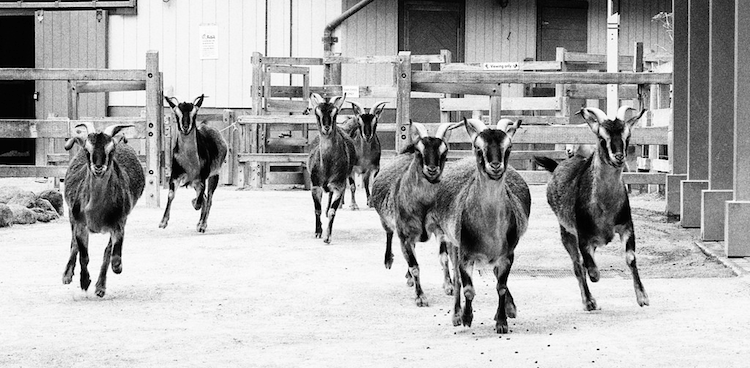
Barbecue, Creole, and soul food are a few of the key words that come to mind when speaking of southern cuisine. Artisan goat cheese isn’t among them – at least fifteen years ago it certainly wasn’t. But a few passionate individuals are working to change that.
The burgeoning food scene in South Carolina’s major cities has garnered national attention in recent years. A stroll down Greenville’s Main Street, home to over 110 restaurants, will convince any foodie that the state has a lot to offer beyond shrimp and grits.
In more rural areas, like South Carolina’s upcountry, many locals are still put-off by goat cheese. Of those who are more familiar with it, many of them have Evi Evans to thank. For 34 years, Evans has been using her goat farm get the community excited about cheese and where it comes from.
A Girl and Her Goats
Dairy farmers typically view their animals as something necessary to sustain a business. For Evi Evans, it was the other way around. “I’d like to say that I have wild dreams at night about cheese,” she says, “but what I really have wild dreams about is beautiful goats.” In the late seventies, Evans made her dreams a reality by starting a goat farm of her own. She built the barn and milked the goats herself, earning just enough profit to buy the 2″x4″s to build a fence. It didn’t take long for her to realize that in order to make enough money to sustain the farm she needed to start selling more than milk. ᅠ
Evans learned the tricks of the trade after embarking on a 1,200-mile road trip into Middle America. There she met up with dairy goat farmers in Minnesota and Wisconsin who were gracious enough to invite her into their homes and show her how their cheese was made. She returned to South Carolina with pictures, detailed notes, and a newfound confidence. “I threw open the door and said, ‘Guess what, guys? We’re going to make goat cheese!’ And there’s been no looking back.”
Even though Evans admits she’s in the business for the goats first-and-foremost, she is passionate about creating a high quality product while maintaining focus on sustainability.
Feta You Can Bet On
From their humble beginnings in Anderson, South Carolina, Split Creek Farm has gone on to earn recognition on a national scale. Their goat milk feta received a perfect score of 100 and was the highest scoring cheese in the competition at the the American Dairy Goat Association meeting in 2009. Split Creek specializes in fresh goat cheese like chevre and fromage blanc, but the feta is by-far their most well-received. It’s a local favorite – even among those who don’t know that what they’re eating is goat cheese. “We do a feta in olive oil with sundried tomatoes,” says Evans. “People will come and say, ‘No, we don’t really want to taste that goat cheese; we came to taste the one with the tomatoes.’ They love that feta.”
Split Creek Farm is also notable in that it’s open to the public seven days a week. Evans believes the agritourism component of her business has helped to them as a valued part of the community. “I want people to think of this farm as their farm,” she says. “There aren’t too many farms that are open to the public. Here they can come and shake my hand, pat my goat’s head, look us both in the eye and feel better about where their cheese comes from.”
Photo Credit: Image courtesy of CarbonNYC [in SF!] via Compfight


